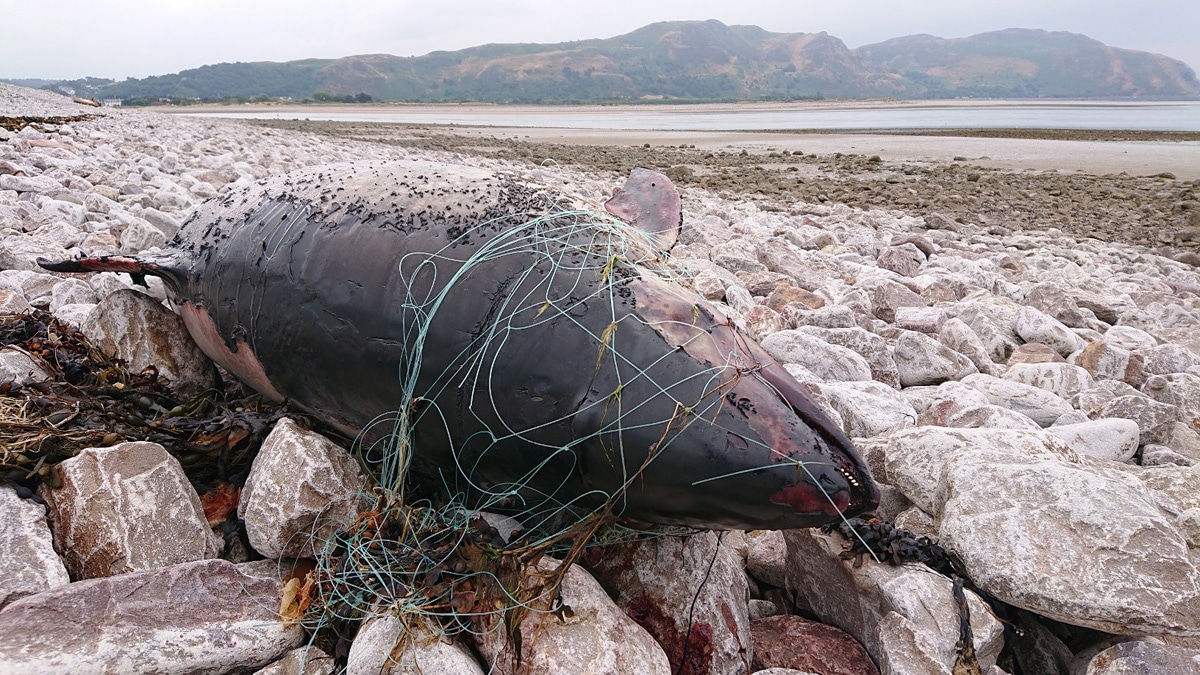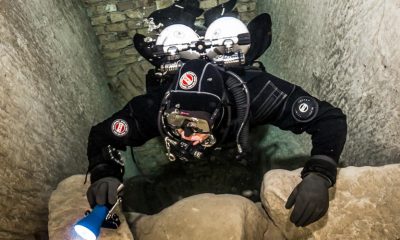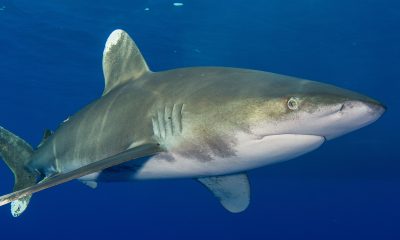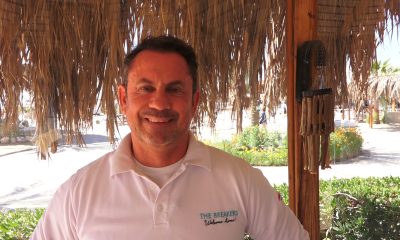Marine Life & Conservation
New report highlights actions on how UK Government can save a dolphin a day

Whale and Dolphin Conservation (WDC) has launched a campaign to stop around a thousand whales, dolphins and porpoises dying in nets and other fishing gear each year, a new report issued today from experts at WDC and co-sponsor of the study HSI (Humane Society International), outlines action the UK and devolved Governments can take now to lead the world on preventing bycatch post Brexit and save a dolphin a day suffering death by suffocation.
Based on recent figures, it is estimated that around 1,000 porpoises, hundreds of dolphins and tens of whales suffer and die in UK fishing gear in waters around the coast every year. WDC’s campaign seeks to highlight that urgent action is needed and is critical in particular for populations such as the harbour porpoise in the Celtic Sea and English Channel, humpback and minke whales in Scottish waters, and common dolphin populations in the Bay of Biscay, and Celtic Sea.
Whilst the EU drags its heels on tackling this matter, the new report – https://uk.whales.org/wp-content/uploads/sites/6/2021/02/cetacean-bycatch-uk-fisheries-problems-solutions.pdf – sets out a range of solutions that the Government and the fishing industry could adopt to reverse the death toll in UK waters and elevate the UK to the world leader in tackling this horrific and unnecessary issue.
Implementing the recommendations in the report now could help to reduce the death rate by the end of 2023 so that bycatch incidents involving marine mammals are all but eradicated (reduced to the occasional accident) by 2030.
WDC’s campaign encourages the UK and devolved Governments to adopt measures to reduce bycatch and increase independent at sea monitoring on fishing vessels by the end of 2021 to track progress. A key action is to start to phase out gill nets (which cause the most deaths) in UK waters, so that alternatives are found for those fisheries with the highest levels of bycatch by 2026.
Bycatch in fisheries is the biggest single killer of whales and dolphins worldwide with several species now close to extinction as a result. Effective solutions developed for UK fisheries could also be used to address the problem elsewhere.
Sarah Dolman, WDCs Bycatch programme lead, said: “No one wants to catch dolphins, porpoises and whales. But bycatch has continued much the same for decades and the research highlights some effective solutions. Now is the time to take action. The Fisheries Act 2020 requires the UK to ‘minimise and where possible eliminate’ dolphin, porpoise and whale bycatch. The UK and devolved governments can fulfil this legal obligation and show global leadership by implementing fleet-wide solutions at sea that will prevent individual dolphins, porpoises and whales suffering, save lives, as well as providing confidence to consumers and the wider public and so benefit fishers.”
Claire Bass, executive director of Humane Society International UK, said: “The seas around the UK are like an assault course for marine mammals, causing largely unseen suffering and death. We would like to see government work with the fishing industry on a plan to phase out fishing gears that are known to be whale, dolphin and porpoise death traps, such as gillnets. Monitoring and reporting of bycatch must also be stepped up, so that timely and effective changes can be put in place to deal with gear or location hotspots. A growing proportion of consumers expect transparency and responsibility in food production, and we fully support WDC’s new campaign to ensure that the suffering caused by the fishing industry will not remain ‘out of sight, out of mind’.”
Russell Leaper, scientist who wrote the report, said: “Good fisheries management involves preventing bycatch. With the changes that are happening in UK fisheries management, there is a real opportunity to make this happen. The best way to do this is by moving away from fishing methods that are the highest risk to our cetaceans.”
For more information about WDC visit their website by clicking here.
Photo Credit: Whale and Dolphin Conservation
Marine Life & Conservation
Double Bubble for Basking Sharks

 The Shark Trust is excited to announce that, for two more days only, all donations, large or small, will be doubled in the Big Give Green Match Fund!
The Shark Trust is excited to announce that, for two more days only, all donations, large or small, will be doubled in the Big Give Green Match Fund!
Donate to Basking in Nature: Sighting Giants
The Shark Trust is hoping to raise £10k which will be doubled to £20k. This will go towards Basking in Nature: Sighting Giants. And they need YOUR help to reach they’re goal.
The Shark Trust’s citizen science project is to monitor and assess basking sharks through sightings; encouraging data collection, community engagement, and promoting nature accessibility. This initiative aims to enhance health and wellbeing by fostering a deeper connection with British Sharks.
Campaign Aims
- Increase citizen science reporting of Basking Sharks and other shark sightings to help inform shark and ray conservation.
- Provide educational talks about the diverse range of sharks and rays in British waters and accessible identification guides!
- Create engaging and fun information panels on how to ID the amazing sharks and rays we have on our doorstep! These can be used on coastal paths around the Southwest. With activities and information on how you can make a difference for sharks and rays!
- Promote mental wellbeing through increasing time in nature and discovering the wonders beneath the waves!
Donate, and double your impact. Click Here
Marine Life & Conservation
Leading UK-based shark conservation charity, the Shark Trust, is delighted to announce tour operator Diverse Travel as a Corporate Patron

 Corporate Patrons provide a valuable boost to the work of The Shark Trust. The Trust team works globally to safeguard the future of sharks, and their close cousins, the skates and rays, engaging with a global network of scientists, policymakers, conservation professionals, businesses and supporters to further shark conservation.
Corporate Patrons provide a valuable boost to the work of The Shark Trust. The Trust team works globally to safeguard the future of sharks, and their close cousins, the skates and rays, engaging with a global network of scientists, policymakers, conservation professionals, businesses and supporters to further shark conservation.
Specialist tour operator Diverse Travel has operated since 2014 and is committed to offering its guests high quality, sustainable scuba diving holidays worldwide. Working together with the Shark Trust will enable both organisations to widen engagement and encourage divers and snorkellers to actively get involved in shark conservation.
“Sharks are truly at the heart of every diver and at Diverse Travel, we absolutely share that passion. There is nothing like seeing a shark in the wild – it’s a moment that stays with you forever!” says Holly Bredin, Sales & Marketing Manager, Diverse Travel.
“We’re delighted to celebrate our 10th year of business by becoming a Corporate Patron of the Shark Trust. This is an exciting partnership for Diverse and our guests. We will be donating on behalf of every person who books a holiday with us to contribute towards their vital shark conservation initiatives around the world. We will also be working together with the Trust to inspire divers, snorkellers and other travellers to take an active role – at home and abroad – in citizen science projects and other activities.”
Paul Cox, CEO of The Shark Trust, said:
“It’s an exciting partnership and we’re thrilled to be working with Diverse Travel to enable more divers and travellers to get involved with sharks and shark conservation. Sharks face considerable conservation challenges but, through collaboration and collective action, we can secure a brighter future for sharks and their ocean home. This new partnership takes us one more valuable step towards that goal.”
For more information about the Shark Trust visit their website here.
For more about Diverse Travel click here.
-

 News3 months ago
News3 months agoHone your underwater photography skills with Alphamarine Photography at Red Sea Diving Safari in March
-

 News3 months ago
News3 months agoCapturing Critters in Lembeh Underwater Photography Workshop 2024: Event Roundup
-

 Marine Life & Conservation Blogs2 months ago
Marine Life & Conservation Blogs2 months agoCreature Feature: Swell Sharks
-

 Blogs2 months ago
Blogs2 months agoMurex Resorts: Passport to Paradise!
-

 Blogs2 months ago
Blogs2 months agoDiver Discovering Whale Skeletons Beneath Ice Judged World’s Best Underwater Photograph
-

 Gear Reviews3 months ago
Gear Reviews3 months agoGear Review: Oceanic+ Dive Housing for iPhone
-

 Marine Life & Conservation2 months ago
Marine Life & Conservation2 months agoSave the Manatee Club launches brand new webcams at Silver Springs State Park, Florida
-

 News3 months ago
News3 months agoWorld’s Best Underwater Photographers Unveil Breathtaking Images at World Shootout 2023


















